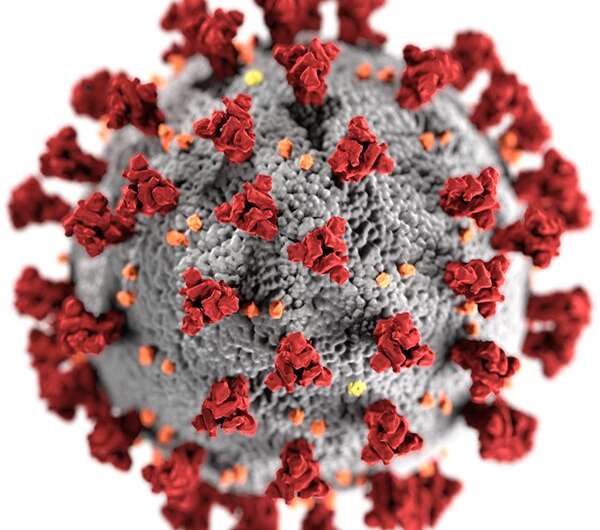Triad of molecules could predict severity of COVID-19

In a new study, published in Nature Medicine, researchers at the Francis Crick Institute, King's College London and Guy's and St Thomas' NHS Foundation Trust, have found a common immune signature in the blood of patients with COVID-19, which could be used to predict how severely ill a patient will become, thereby aiding patient management.
The team analyzed blood samples from 63 patients with SARS-CoV-2, the virus that causes COVID-19, who were treated at Guy's Hospital and St Thomas' Hospital, London. Among several molecules expressed at atypical levels in the blood of patients, the researchers identified three in particular that could indicate how the disease will progress—what the researchers are calling the "triad," made up of IP-10, interleukin-10 and interleukin-6.
Patients with COVID-19 who displayed measurably higher levels of these molecules when first admitted to hospital went on to become more severely ill. The triad was found to be a rigorous predictor of disease severity than commonly-used clinical indicators, including C-reactive protein (CRP), D-dimer or ferritin.
In addition, they found that within their patient cohort, measuring levels of IP-10 in blood taken on the first day in hospital was the most accurate way to date of predicting how long the patient would remain in hospital. The researchers are now looking to new collaborators to help develop robust, easily applied tests for these molecules.
Project lead Adrian Hayday, who heads the Crick's Immunosurveillance Laboratory and is Professor of Immunobiology at King's College London, says: "As we approach the upcoming winter flu season, along with the threat of resurgent cases of COVID-19, it is possible that our hospitals will come under great pressure. To handle this, we need to equip our doctors with the tools to make informed judgements about which patients are likely to improve and who might need more urgent care."
This work is part of the ongoing COVID-IP study. Since their preliminary analysis carried out in May, the team have now compared the immune signatures of COVID-19 patients with 10 age-matched patients who had non-COVID-19 lower respiratory tract infections. They found that high levels of the triad were not seen in those patients, suggesting this feature, in combination with other traits, may form a core COVID-19 immune signature.
Manu Shankar-Hari, Reader and Consultant in Intensive Care Medicine at King's College London, consultant in intensive care medicine at Guy's and St Thomas' NHS Foundation Trust, and NIHR Clinician Scientist says: "This partnership is a great example of how researchers and clinicians have worked together at speed during this pandemic. We've seen how bringing these specialisms together, working side-by-side, has opened up a greater understanding of this disease and how the body responds. With so much uncertainty for the months ahead, it's vital that we apply this knowledge to give every patient the best chance of a full recovery."
As well as continuing to monitor the immune response of patients in hospital, the team are also using these blood samples to gain further insights into the disease and are part of PHOSP (Post-HOSPitalization COVID-19 study), a national consortium working to understand and improve long-term health outcomes for patients who were hospitalized with COVID-19.
More information: Adam G. Laing et al. A dynamic COVID-19 immune signature includes associations with poor prognosis, Nature Medicine (2020). DOI: 10.1038/s41591-020-1038-6


















